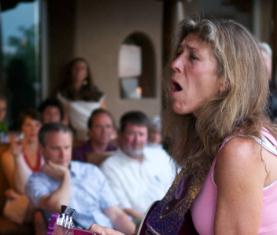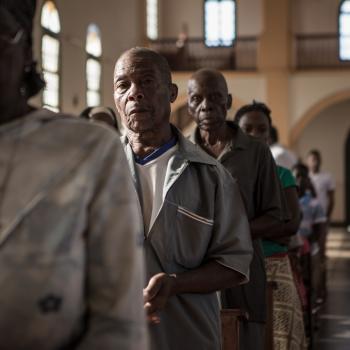 I don’t go to church. I haven’t for a number of years. Apparently that doesn’t make me unusual; I share this absenteeism with an ever growing population in the United States, a group which includes even President Obama.
I don’t go to church. I haven’t for a number of years. Apparently that doesn’t make me unusual; I share this absenteeism with an ever growing population in the United States, a group which includes even President Obama.
When we were newly married, my wife and I visited some churches, looking for a community of like-minded people to join, but nothing took. We tried one liberal Christian church that my wife liked, but I didn’t. The language of their worship service got to me. Even though I knew that in this church they didn’t mean quite the same thing as they did in my childhood church, I still had knee-jerk reactions to the churchy catchphrases.
We tried the Unitarian church, but the overall atmosphere was too angry and political. My wife’s dad advised that we go easy on them—they are, after all, Unitarians in Lynchburg, Virginia, which he said would tend to make you feel a little pissed off. Still, it felt more like a rally than a church service. After that we stopped looking.
I grew up in church. A pastor’s kid, I was, as they say, in church every time the doors were open. I am happy not to be a part of that grind anymore, not putting on dress clothes every weekend, not rushing out on a day I want to be lounging around on the day bed reading the Times, working the crossword puzzle. Truth is I don’t like church.
I am not thinking in terms of the church in its universal sense right now, the sense in which St. Cyprian writes that “You cannot have God for our Father if you do not have the Church for your mother.” I am thinking about the church in the local sense, as an interdependent community of like-minded people.
One of my problems is that where I live, as an artist, I do not feel that I fit anywhere: On the one side are believers who have no use for art except as a tool for apologetics, polemics, and evangelism. On the other side are those who understand and appreciate art, but have no tolerance for talk of faith or mystery. The well here is poisoned.
This year I attended The Glen Workshop East hosted by Image. My first actual Glen. It was made possible by a scholarship, for which I am grateful; without it I could not have made the trip. In mid-June I drove ten hours from The Glen in South Hadley, Massachusetts back home to Lynchburg, Virginia, tired and happy.
I had spent the week in Erin McGraw’s amazing fiction workshop. I’d gone to readings, listened to musicians play their own compositions. I’d seen artists of all kinds who were there to create, and to commune with other creators.
I remember The Glen in Santa Fe (now called Glen West), when I was there concurrently as an MFA student, with the theme People of the Book, and all the talk of art as this safe place, this sanctuary in which seekers of all faiths and traditions can come and meet and have meaningful exchanges in safety and mutual respect.
The idea washed through me and changed the way I see both art and faith. This idea does not make art into religion in some romantic way. Art is just the good clean dirt in which faith can grow, the woods in which mystery can be glimpsed like a running deer—and a fleeting glimpse here, a flash there, is all anyone is ever allowed.
And the people: The dorm where I was staying had a wide and solid fire escape where a group of us gathered and drank beer. We talked craft. We described our projects. We shared stories of our lives. We played instruments and sang.
And yes we discussed art and faith and mystery—sometimes with a healthy dose of irreverence that comes not from derision but from a desire not to take ourselves too seriously. At Glen East I reconnected with people from the MFA program I hadn’t seen in several years. I met for the first time a lot of amazing artists and thinkers. I came home with my soul full to overflowing.
I have always felt the outsider in church, even growing up as the pastor’s son. I have always moved on the fringes of every group to which I belong.
It might be telling that this group of people—many of whom I saw for the first time in three years at Mt. Holyoke; some of whom I only know online, and have not yet seen in person—make up what I now consider my church.
Do you have to be physically present, face to face with those in your community? Jean Vanier says that community is being created when we come together and thank God for “having put in a finite body the seeds of eternity which are visible in small and daily gestures of love and forgiveness.”
Is it really possible to live this way with a group of people online? I don’t know.
I do know that the people with whom I feel communion are not around for me to meet with physically. We cannot have a Glen every Sunday. If we did, surely it would eventually wear thin.
But as artists connected by our belief in mystery, we are a church. We are spread all over. But in a very real sense, at least as I see it, this is my local church.
Vic Sizemore earned his MFA in fiction from Seattle Pacific University in 2009. His fiction and nonfiction are published or forthcoming in Story Quarterly, Southern Humanities Review, PANK Magazine, Pembroke, Saint Katherine Review, Rock & Sling and elsewhere. An excerpt from his novel The Calling was a finalist for the Sherwood Anderson Award; other excerpts from The Calling are published in Portland Review and are forthcoming serially in Connecticut Review. His short story “Hush Little Baby” won the 28th New Millennium Writings Award for Fiction. Sizemore teaches at Central Virginia Community College.











